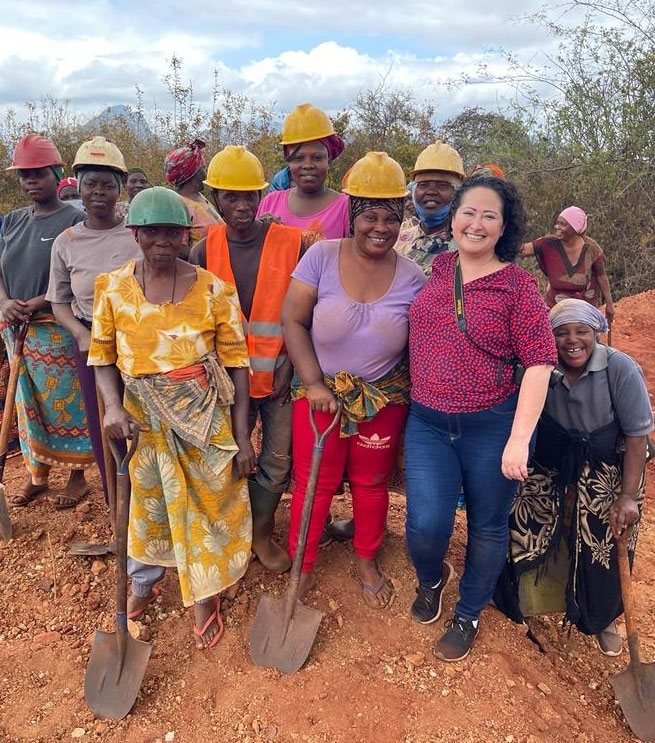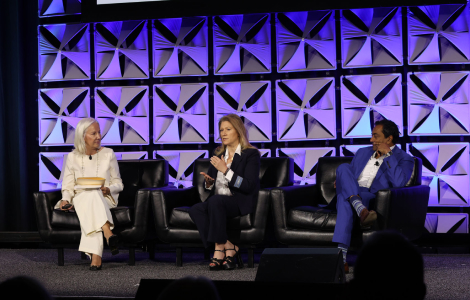Interview with Stefanie Cohen, Head of Sustainability, Swarovski
Swarovski reports progress in achieving positive business practices for women, recognizing that it needs to proactively create networks to support women.
How does gender equality fit into your business strategy?
At Swarovski, we want to be recognized as a company that’s built on a foundation of equality and inclusivity. We aim to champion diversity and celebrate people’s individuality. This has been part of our DNA for many years and is fully embedded in our LUXignite strategy.
Equality, Diversity & Inclusion are one of our six most important focus areas within our Sustainability strategy that we are integrating into our business across the value chain, from how we design our products to how we produce them and how we market them.
Women make up 77% of our workforce and the majority of our customers, so we believe our business is especially well-placed to champion gender equality.
In 2018 we launched ‘The Future is Equal’ campaign to observe International Women’s Day and have run consecutive year on year campaigns to engage with our global workforce across office, retail and production on issues like breaking bias and local fundraising for women’s empowerment charities.
Have you seen progress in gender empowerment in your company? What steps have you taken? Success stories?
Swarovski was a very early signatory of the United Nations’ Women’s Empowerment Principles (UN WEP), a set of principles for business offering guidance on how to empower women in the workplace, marketplace and community. We became a signatory in 2014, and since 2017 we have been assessing ourselves biannually using the WEP’s Gender Gap Analysis Tool for businesses in order to track our progress. The good news is that we have improved in every assessment so far, showing our increasing focus and progress in fostering a positive business practice for women. But there is still a lot that we need and want to do to advance further. Some of our programmes are listed below…
Our WeShine programme (internal programme concentrating on EDI on our manufacturing sites) has been running since 2018 and focuses on working on the ground NGOs to overcome barriers that workers face in our production locations. Due to the high number of women in our production, the most prolific issues are centred around gender.
We worked with Raks Thai in 2019-2020 to improve financial literacy, understanding of sexual health, and provide support on gender equality issues in one of our production facilities in Thailand, and we are currently working on how we can roll out this programme globally. In 2022 we partnered with BSR in India and Vietnam to run tailored HER projects to empower and support female workers who are represented at the lowest tier in supply chains and often carry a dual burden to earn and care for the family. The programme supports them in health-related issues, increasing health awareness, and access to health services through sustainable workplace initiatives.
We have an established eLearning portfolio including eLearning modules covering unconscious bias, microaggressions and allyship. In 2018-2020, we partnered with the NeuroLeadership Institute carrying out global unconscious bias training sessions, to help employees understand how to stop bias from impacting their decisions, creating a more inclusive and diverse environment for all.
Our Employee Resource Groups (ERGs) are crucial to creating a sense of inclusion and belonging. ERGs are employee-led groups that contribute to fostering a more diverse and inclusive workplace. Participants are usually employees who feel connected by a mixture of shared interests, experiences, or backgrounds. We currently have ERGs focused on women’s empowerment, but also pride, disability and working parents across the world.
We have been running #IamRemarkable sessions across the business since 2019 to encourage underrepresented groups to recognize the power of self-promotion and boost confidence in the workplace and beyond. #IamRemarkable is a worldwide Google initiative.
Swarovski is a Lean In partner. We recognize that we need to proactively create networks to support women, and to foster connections across our workplaces, encouraging the exchange of ideas and inspiring confidence.
What are the challenges and opportunities?
It is vital to understand the issues in order to develop meaningful programmes. The challenges are widespread and vary depending on the area of the business and the geography.
For example, in 2018 we partnered with BSR to conduct ground-breaking research exploring the role of women in the jewellery supply chain and the challenges they face to their wellbeing and career advancement. Some of the issues found included the lack of formal employment opportunities, a lack of women in leadership and female role models, low wages and poor working conditions, exposure to health and safety hazards and low levels of education increasing the risk of sexual harassment and gender-based violence.
While this work was focused primarily on the production and cutting/mining sector largely taking place in Asia, the challenges we face to achieve gender equality in other parts of the world and in our retail and office population are different.
In order to drive meaningful change, detailed analysis is required to understand the issues and address them in the right way – instead of just applying a watering can type solution or virtue signalling.
What are your priorities? Are there any frameworks you use to help you in your journey? Do you have targets and how do you measure them?
The WEPs is a very useful tool that allows us to assess ourselves and to use as a compass to guide further programmes.
In 2021 we published a number of commitments that focus not only on gender but are also related to progress in the broader Equality, Diversity & Inclusion area.
- Building a diverse leadership population that includes underrepresented groups. As a first step, we aim to have 45% of our top and senior management positions filled with female leaders.
- Reducing bias in our recruitment by exploring innovative recruitment practices, including AI technology.
- Increasing the diversity of our marketing materials to include individuals from underrepresented groups.
- Celebrating the LGBTQ community, providing education and awareness opportunities.
How important is WJI 2030’s third pillar to support you in your journey?
What one company can do is limited. We have neither endless resources nor funds. Action needs to happen across companies and industries. Much of what we have learned so far can be applied to other businesses and we need to join forces to make progress. I do hope that within WJI 2030 we can work further to understand in even greater detail the gender equality related issues we face and jointly develop programmes to resolve them.
How has your personal journey been? What are your hopes for the future?
I worked for many years in a large American consumer goods company and have now been at Swarovski for the past seven years. While a lot has been achieved, the challenges for gender equality are far from being resolved, even here in Europe. I am a working parent and this still often puts me in a situation of having to prioritise between work and family more than I would like. Expectations of men vs. women in relation to childcare are still far from equal, in some countries less and in some countries more so. Key enablers are equal parental leave policies and flex work arrangements – but also the company culture. My very personal hope for the future is that my children – no matter if boy or a girl – will take care of their kids equally, and that the topic of gender equality in the workplace will become much less of an issue.








